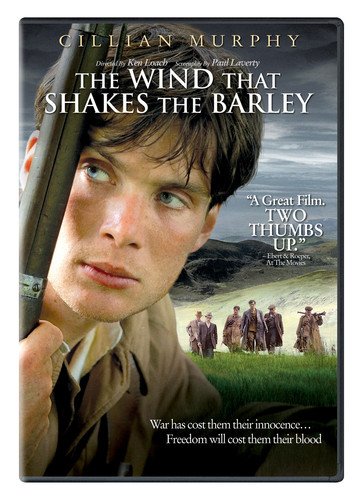
Written by Mule
The Wind That Shakes the Barley (2006) directed by Ken Loach stars Cillian Murphy (Damien O’Donovan), Pádraic Delaney (Teddy Donovan), Liam Cunningham (Dan), Orla Fitzgerald (Sinéad), Laurence Barry (Micheál), Mary Murphy (Bernadette), Mary O’Riordan (Peggy), Myles Horgan (Rory), Martin Lucey (Congo), Roger Allam (Sir John Hamilton), John Crean (Chris Rielly), Damien Kearney (Finbar) Frank Bourke (Leo), Shane Casey(Kevin), and Sean McGinley (Father Denis).
The story takes place during the Irish War of Independence (1919-21) and the Irish Civil War (1922-23) in the County Cork in Ireland. It centers around the two O’Donovan brothers, Damien and Teddy. Damien starts out wanting to leave Ireland for London in order to complete his education as a doctor, but due to some trouble after a game of hurling where a young man, Michaél, is beaten to death by British soldiers and a scene at the railway station where soldiers beat on the driver and the conductor of the train, Damien decides to stay and fight alongside his brother Teddy, who is already committed to the IRA.
This is a strange amalgam of the personal aspects of fighting a guerrilla war on home turf, a tale of two brothers who start out on the same side and share most of their views, but with a clear rift forming as time wears on, and the psychological aspects of this particular kind of fighting. The backdrop is political in every sense of the word, but the main focus, in my opinion, is on how intensely personal politics can be on this scale. Teddy is the clear leader on the military side of things, and Damien is the one who gets dragged into the fighting by circumstance but commits to it wholeheartedly.
Lets be very clear on one thing right off the bat. The British soldiers, the Black and Tans, and the landowners are the bad guys in this. They are as unsympathetic as any cliché Nazi officer in a standard WWII movie. They bellow commands, bully the locals, beat on women and children, and kill without discrimination. There is no attempt at all to give the Brits any kind of nuance. All the energy goes into making the Irish freedom fighters as complex and interesting as possible, which they certainly are.
In the course of events the two brothers wind up on opposite sides to the extent that Damien ends up in front of a firing squad. It’s grim business, fighting a war like this one, something that is illustrated for example when Damien receives the order to execute a traitor in his own little cadre, Chris, who has given information to the British. The thing is, there is no distance to be had for Damien. He grew up with Chris and he has to bring news of his death to his mother and then take her to where Chris is buried. Damien does all this because he believes in what they are fighting for, but that does not make it any less difficult to deal with the fact that he had to face the mother’s grief and hatred.
The camera keeps a respectful distance from the violence; Loach favoring a more panoramic view, which lends some detachment to the intensely personal events. It is no doubt a controversial theme, so choosing to look at this from the individual’s perspective makes sense. This is not a huge battle of unknown soldiers, but small interpersonal exchanges that have a profound impact on each individual life. Themes of loyalty and betrayal, of personal loss and grief are all played out under the bigger umbrella of political ideology and national freedom. The British are a brutal colonial force and the IRA are fighting oppression, at overwhelming odds, I might add.
Cillian Murphy’s character Damian has an innate intensity, and the basic premise that he has to have sworn the Hippocratic oath at some point and still executes two people point blank is not something the viewer gets slammed with, other than in his quiet discussion of how something like that changes a man. It also shows how violence breeds more violence when the Black and Tans harass the locals and the IRA hits back, only to have the Black and Tans come back and up the body count. It is terrifyingly predictable how the violence keeps escalating after that. There is also the perpetual struggle of poor working class against those who have power and money, and in this case money to buy guns.
There is a fair amount of moral ambiguity in all this, one way or the other, and things take a turn for the more complicated when truce is declared and the Anglo-Irish treaty is signed. Teddy backs the treaty and Damien does not. It becomes a case of two moral, political and philosophical standpoints embodied by two brothers, who of course have their own little node of fraternal tension working under that.
This is a beautifully shot, thematically complex and ambitious piece of cinema without it becoming pretentious, with strong character performances throughout, even though it sometimes leans a little in the direction of cliché with women weeping as the soldiers push them about. The almost naturalistic acting style makes it more than worth watching, no matter what your political standpoint might be.